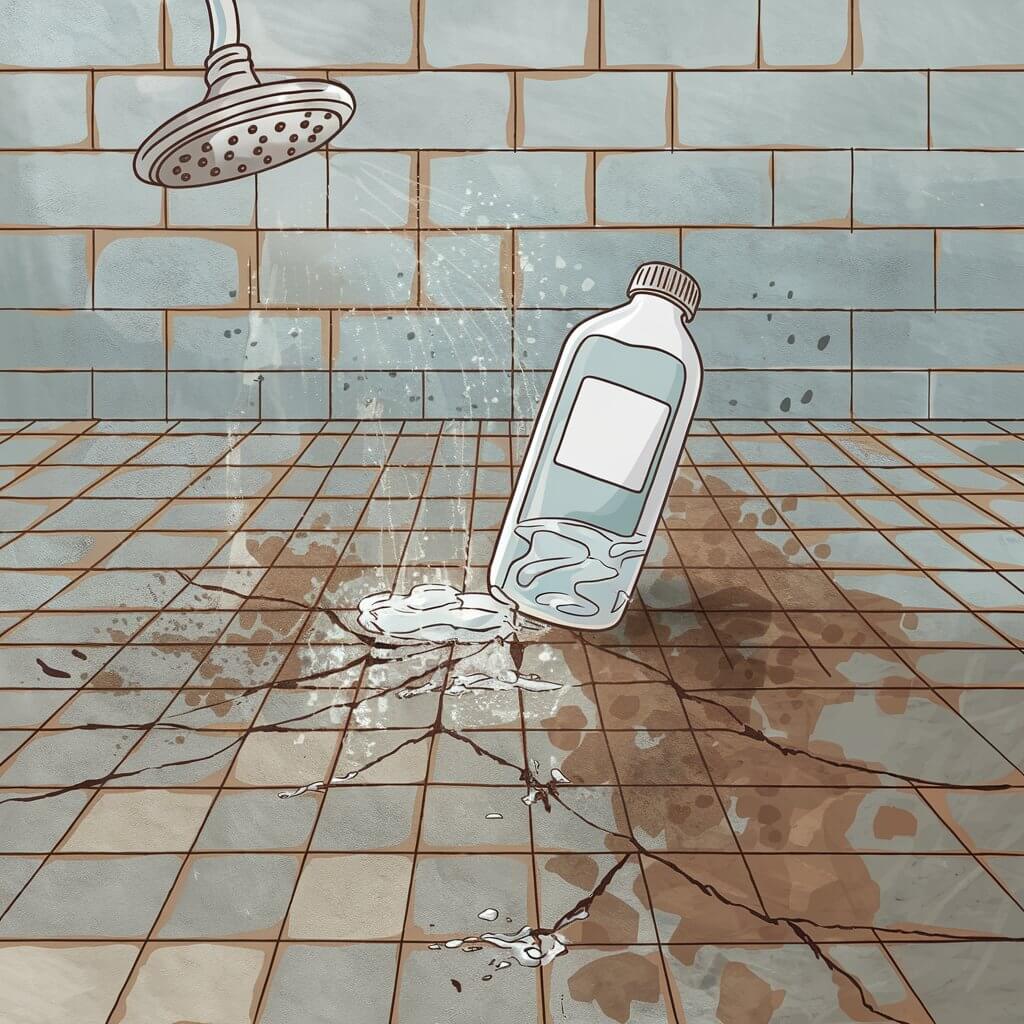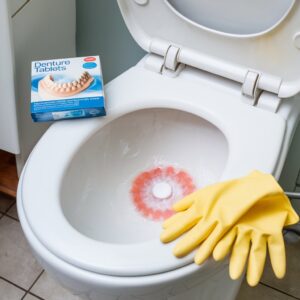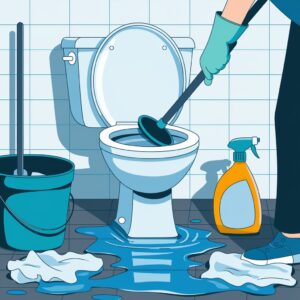Using toilet bowl cleaner in your shower isn’t a good idea due to its harsh chemical composition which can cause both surface damage and pose health risks. If it gets on your skin, it can lead to severe chemical burns, particularly on sensitive areas like your face or genitals. In your shower, these potent chemicals can eat away at grout, discolor fixtures, deteriorate tiles, damage protective glazes, and even etch glass on shower doors. Additionally, they can degrade sealants, potentially leading to leaks and subsequent water damage. There are safer, eco-friendly alternatives that effectively clean without these risks, offering a mandate for further exploration of those options.
Table of Contents
- Key Takeaways
- Risks of Chemical Burns
- Surface Damage Concerns
- Environmental Impact
- Alternative Cleaning Solutions
- Frequently Asked Questions
Key Takeaways
- Toilet bowl cleaner can erode grout, damaging the integrity of shower tiles.
- Harsh chemicals in the cleaner may discolor and deteriorate shower fixtures.
- Using toilet bowl cleaner on shower doors risks glass etching and surface damage.
- The abrasive chemicals compromise the protective glaze on tiles, leading to deterioration.
- Chemical runoff from these cleaners can cause environmental damage, including water contamination.
Risks of Chemical Burns
Using toilet bowl cleaner on your skin can lead to severe chemical burns, particularly in your more sensitive areas. To prevent such injuries, always wear protective gloves and avoid direct contact with your skin. If the cleaner does contact your skin, immediately rinse the area with copious amounts of lukewarm water. This first aid response is crucial to mitigate the impact of the chemical burn.
Your skin’s sensitivity varies across different body parts, with areas like the face and genitals being particularly vulnerable. In case of exposure, apply a gentle, fragrance-free moisturizer to soothe the skin after washing. If redness, pain, or blistering occurs, it’s essential to seek treatment options promptly. Over-the-counter hydrocortisone cream may help reduce inflammation, but professional medical advice is recommended for appropriate care.
In an emergency, where the chemical burn is extensive or intensifying, call emergency services immediately. While waiting for help, continue to rinse the affected area with water. Don’t apply creams, ointments, or remedies without professional guidance as these can sometimes worsen the condition.
Surface Damage Concerns
Why risk the integrity of your shower surfaces by using toilet bowl cleaner? The harsh chemicals in these cleaners can cause significant damage over time, affecting both the appearance and durability of your bathroom.
First, consider grout erosion. The acidic nature of toilet bowl cleaners can eat away at the grout between tiles, weakening the structure and leading to costly repairs.
Next, there’s fixture discoloration. Metals and plastics in your shower fixtures can react adversely to the harsh chemicals, resulting in unsightly staining or fading that diminishes the overall look of your bathroom.
Similarly, tile deterioration is a common issue; the protective glaze on shower tiles can be compromised, leading to dullness and increased susceptibility to further damage.
Glass etching is another concern. The abrasive chemicals can leave permanent marks on shower doors and enclosures, which not only look unpleasant but can also weaken the glass.
Finally, sealant degradation occurs when the sealing compounds that protect edges and corners start to break down, leading to leaks and water damage.
It’s wise to choose products specifically designed for showers to avoid these issues, ensuring your bathroom remains in top condition.
Environmental Impact
Beyond the potential damage to your bathroom surfaces, toilet bowl cleaners also pose significant environmental risks when they enter our water systems. These products often contain harsh chemicals that can lead to water contamination.
When you rinse these cleaners down your shower drain, they don’t just disappear; they travel through plumbing and can end up in local waterways. This not only affects the water quality but also contributes to toxic runoff, which is a major concern for environmental safety.
The compounds found in some toilet cleaners can also infiltrate the soil, leading to soil pollution. This contamination can alter the composition of the soil, making it less fertile and disrupting the growth of plants. More alarmingly, these pollutants can seep into groundwater, affecting both ecosystems and human health.
Moreover, the aquatic harm caused by these chemicals is profound. When they make their way into lakes, rivers, and oceans, they can be toxic to aquatic life, causing both immediate and long-term ecosystem damage. This disrupts not just individual species but can lead to broader ecological imbalances.
It’s crucial you’re aware of these potential environmental impacts. By understanding them, you can make more informed decisions about the products you use in your home.
Alternative Cleaning Solutions
Many safer, effective alternatives are available for cleaning your shower without the risks associated with traditional toilet bowl cleaners. You can choose from a variety of non-toxic products on the market, which are designed to be gentle on both your health and the environment.
For a more hands-on approach, consider creating your own DIY cleaners using natural ingredients typically found in your pantry. A popular homemade solution involves mixing vinegar and baking soda. This combination effectively cuts through soap scum and mildew without the harsh chemicals. Simply apply the paste to the affected areas, let it sit for a few minutes, then scrub gently and rinse.
If you’re interested in further eco-friendly options, lemon juice and salt can form another powerful cleaning agent. The acidity of the lemon dissolves grime, while the salt acts as a light abrasive to scrub away residues. These ingredients ensure that you’re not only using a safe method but also protecting the environment from harmful chemicals.
Frequently Asked Questions
Can Toilet Bowl Cleaner Discolor My Shower Curtain?
Yes, toilet bowl cleaner can discolor your shower curtain due to harsh chemicals. It poses health risks and can damage surfaces. Seek safer cleaning solutions to avoid environmental impact and ensure bathroom safety.
Is the Odor of Toilet Bowl Cleaner Harmful to Breathe?
You should avoid breathing in toilet bowl cleaner fumes due to health risks. Inhalation can irritate your eyes, throat, and harm your respiratory system through toxic chemical exposure, worsening indoor air quality.
How Quickly Can Toilet Bowl Cleaner Damage Shower Surfaces?
Toilet bowl cleaner can damage shower surfaces quickly, depending on cleaning frequency. It causes rapid surface erosion, chemical reactions, and stain formation. Always check material compatibility and use protective coatings to prevent costly repairs.
Can Toilet Bowl Cleaner Affect Water Quality if Not Rinsed Well?
Yes, if you don’t rinse toilet bowl cleaner thoroughly, chemical residue can harm water quality, posing health risks and environmental impact. Always ensure proper rinsing to prevent these issues in your shower.
Are There Any Safe Uses for Toilet Bowl Cleaner in the Bathroom?
You shouldn’t repurpose toilet bowl cleaner elsewhere in the bathroom. For alternative uses, consider eco-friendly or DIY solutions that ensure safety and proper disposal without risking damage or environmental harm.



